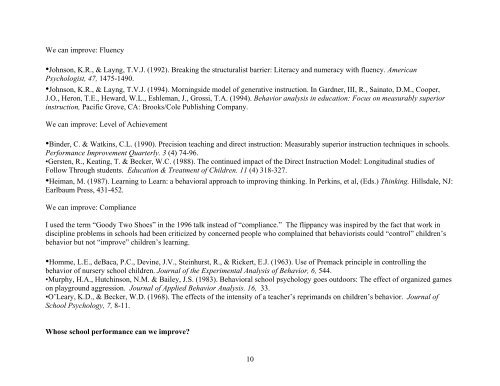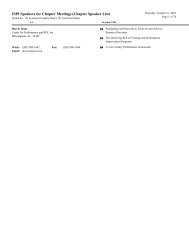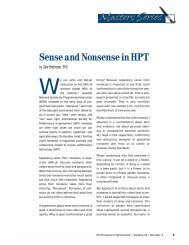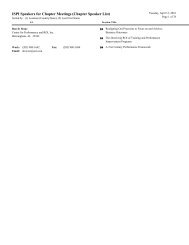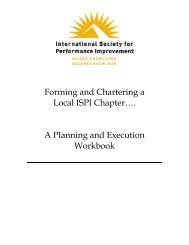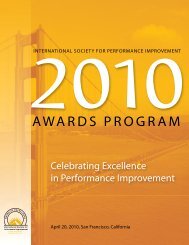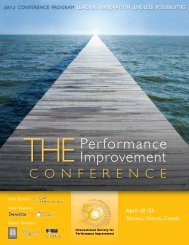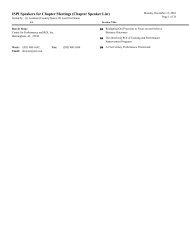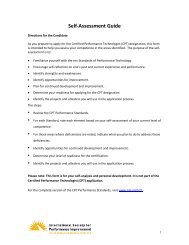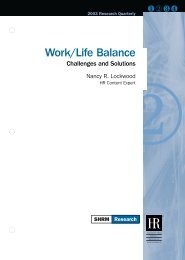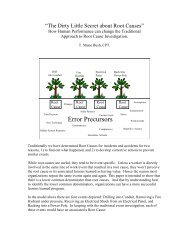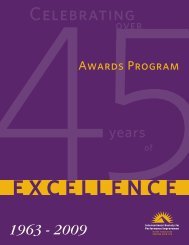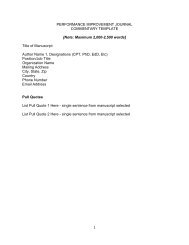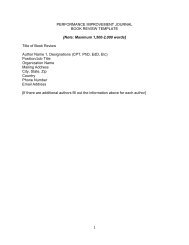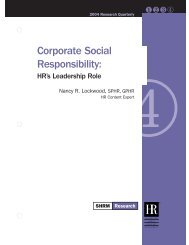Yes We Can! - International Society for Performance Improvement
Yes We Can! - International Society for Performance Improvement
Yes We Can! - International Society for Performance Improvement
Create successful ePaper yourself
Turn your PDF publications into a flip-book with our unique Google optimized e-Paper software.
<strong>We</strong> can improve: Fluency<br />
•Johnson, K.R., & Layng, T.V.J. (1992). Breaking the structuralist barrier: Literacy and numeracy with fluency. American<br />
Psychologist, 47, 1475-1490.<br />
•Johnson, K.R., & Layng, T.V.J. (1994). Morningside model of generative instruction. In Gardner, III, R., Sainato, D.M., Cooper,<br />
J.O., Heron, T.E., Heward, W.L., Eshleman, J., Grossi, T.A. (1994). Behavior analysis in education: Focus on measurably superior<br />
instruction, Pacific Grove, CA: Brooks/Cole Publishing Company.<br />
<strong>We</strong> can improve: Level of Achievement<br />
•Binder, C. & Watkins, C.L. (1990). Precision teaching and direct instruction: Measurably superior instruction techniques in schools.<br />
Per<strong>for</strong>mance <strong>Improvement</strong> Quarterly. 3 (4) 74-96.<br />
•Gersten, R., Keating, T. & Becker, W.C. (1988). The continued impact of the Direct Instruction Model: Longitudinal studies of<br />
Follow Through students. Education & Treatment of Children. 11 (4) 318-327.<br />
•Heiman, M. (1987). Learning to Learn: a behavioral approach to improving thinking. In Perkins, et al, (Eds.) Thinking. Hillsdale, NJ:<br />
Earlbaum Press, 431-452.<br />
<strong>We</strong> can improve: Compliance<br />
I used the term “Goody Two Shoes” in the 1996 talk instead of “compliance.” The flippancy was inspired by the fact that work in<br />
discipline problems in schools had been criticized by concerned people who complained that behaviorists could “control” children’s<br />
behavior but not “improve” children’s learning.<br />
•Homme, L.E., deBaca, P.C., Devine, J.V., Steinhurst, R., & Rickert, E.J. (1963). Use of Premack principle in controlling the<br />
behavior of nursery school children. Journal of the Experimental Analysis of Behavior, 6, 544.<br />
•Murphy, H.A., Hutchinson, N.M. & Bailey, J.S. (1983). Behavioral school psychology goes outdoors: The effect of organized games<br />
on playground aggression. Journal of Applied Behavior Analysis. 16, 33.<br />
•O’Leary, K.D., & Becker, W.D. (1968). The effects of the intensity of a teacher’s reprimands on children’s behavior. Journal of<br />
School Psychology, 7, 8-11.<br />
Whose school per<strong>for</strong>mance can we improve?<br />
10


